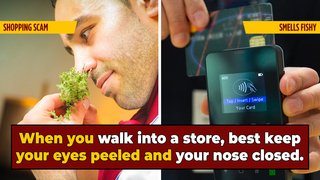How 'Scent Directors' Are Tricking Your Nose Into Spending More $$$

From annoying autoplay videos to unskippable ads, modern marketing is all about making corporate shilling impossible to ignore. In that pursuit, an entirely new industry is popping up to invade not just your ears or eyeballs but a whole other one of our crevices: the nose.

Aside from those Facebook videos of stray puppies being given a bath, nothing is as emotionally manipulative as a smell. This is something salespeople have known for ages: second-hand car dealers will spray their jalopies with new-car scented chemicals while realtors will flood bare homes with the smell of Kroger's cookies they've heated up in the oven. But recently, entire marketing firms have decided to get in on the aroma action with dedicated "scent marketing" -- and not just for clothing stores that waft Drakkar Noir through the vents while they disorient you with techno music blasted at black-site volumes.
Don't Miss
For just a few thousand dollars, a "scent director" will use "nebulization technology" to design a unique perfume to pump through the HVAC of any type of building. Companies like ScentAir and Air-Scent (look, they're smell-smiths, not wordsmiths) cater to casinos, sports stadiums, and hospitals, with luxury apartment buildings slowly becoming their biggest customers. Even One World Trade Center's observatory now crop dusts tourists with the calming corporate perfume of "citrus, beech trees and red maples" in the hopes of getting the phantom smell of melted steel beams out of their noses.

Because the emotional response to a scent is instantaneous, sensory marketing isn't just like an ad you can't turn off; it also tricks your conscious brain into ignoring it as a form of manipulation. And these targeted chemical attacks have one main objective: to lower your resistance to spending. Neurological analysts have figured out an indistinct but familiar scent in a casino will further make gamblers lose their sense of time and turn slot machines 45% more profitable. Meanwhile, mixing baby powder and citrus with the smell of tanned hides will get people to linger far longer in leather goods stores than average (the same is true for a pine scent in furniture stores), and misting Nike sneakers with a calming, non-foot fungus-y smell increased customers' intent to buy with a whopping 80%.
But unlike targeted ads, the fire-and-forget approach of aroma marketing can backfire in a big way. The human brain can flood with paranoia when you smell something you can't spot the source of. So if your nose transports you to the beach in the middle of an IKEA, your brain will let you know something smells fishy, encouraging you to get out as quickly as possible. Furthermore, while having a positive nostalgic trigger to smells can lower your defenses, the opposite reaction is a million times more potent. Being transported back to the time your first crush threw your Valentine's bonbons in your face will guarantee you walk out of that chocolate-infused M&M Store empty-handed. Whatever the effect, the fact that subliminal sensory marketing remains unregulated and can mess with consumers' brains can be seen as a gross violation of business ethics. So when you walk into a place wanting to spend money, best keep your eyes peeled and your nose closed.
For the smell of bad puns and failure, you can follow Cedric on Twitter.
Top Image: RestaurantAnticaRoma/Pixabay, AhmadArdity/Pixabay